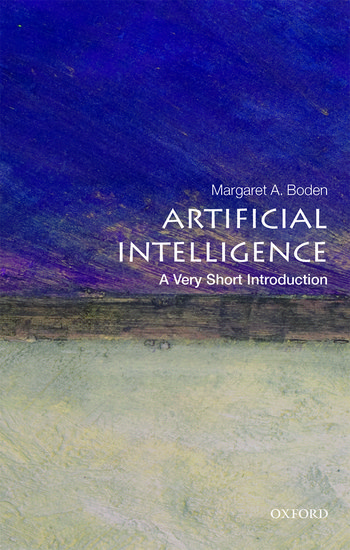Home >
A Very Short Introduction >
Artificial Intelligence (Computers)
A Very Short Introduction | Computers
Artificial Intelligence
ISBN: 9780199602919
Series: A Very Short Introduction
Artificial Intelligence (Computers)
A Very Short Introduction Artificial Intelligence (Computers) Media > Books > Non-Fiction > Education Books Expect Delays of Up to 4 Weeks| Order Below |
ISBN
9780199602919 (10-digit ISBN: 0199602913)
- Description
- Key Features
- Series Description
- Table of Contents
- Presents a rounded view of Artificial Intelligence, its history, its successes, its limitations, and its future goals
- Considers the realistic and unrealistic expectations we have placed on AI
- Shows how the results of Artificial Intelligence have been valuable in helping to understand the mental processes of memory, learning, and language for living creatures
- Explores the issues AI raises about what it means to be creative, intelligent, conscious - and human
- First published in hardback as AI: Its nature and future
The applications of Artificial Intelligence lie all around us; in our homes, schools and offices, in our cinemas, in art galleries and - not least - on the Internet. The results of Artificial Intelligence have been invaluable to biologists, psychologists, and linguists in helping to understand the processes of memory, learning, and language from a fresh angle.As a concept, Artificial Intelligence has fuelled and sharpened the philosophical debates concerning the nature of the mind, intelligence, and the uniqueness of human beings. In this Very Short Introduction , Margaret A. Boden reviews the philosophical and technological challenges raised by Artificial Intelligence, considering whether programs could ever be really intelligent, creative or even conscious, and shows how the pursuit of Artificial Intelligence has helped us to appreciate how human and animal minds are possible.
Oxford's Very Short Introductions series offers concise and original introductions to a wide range of subjects--from Islam to Sociology, Politics to Classics, Literary Theory to History, and Archaeology to the Bible.
Not simply a textbook of definitions, each volume in this series provides trenchant and provocative--yet always balanced and complete--discussions of the central issues in a given discipline or field. Every Very Short Introduction gives a readable evolution of the subject in question, demonstrating how the subject has developed and how it has influenced society. Eventually, the series will encompass every major academic discipline, offering all students an accessible and abundant reference library.
Whatever the area of study that one deems important or appealing, whatever the topic that fascinates the general reader, the Very Short Introductions series has a handy and affordable guide that will likely prove indispensable.
Please note: As this series is not ELT material, these titles are not subject to discount.
1: What is Artificial Intelligence?
2: Generality as the Holy Grail
3: Language, Creativity, Emotion
4: Artificial Neural Networks
5: Robots and Artificial Life
6: But is it Intelligence, Really?
7: The Singularity
Further Reading
Index
The applications of Artificial Intelligence lie all around us; in our homes, schools and offices, in our cinemas, in art galleries and - not least - on the Internet. The results of Artificial Intelligence have been invaluable to biologists, psychologists, and linguists in helping to understand the processes of memory, learning, and language from a fresh angle.As a concept, Artificial Intelligence has fuelled and sharpened the philosophical debates concerning the nature of the mind, intelligence, and the uniqueness of human beings. In this Very Short Introduction , Margaret A. Boden reviews the philosophical and technological challenges raised by Artificial Intelligence, considering whether programs could ever be really intelligent, creative or even conscious, and shows how the pursuit of Artificial Intelligence has helped us to appreciate how human and animal minds are possible.
Key Features
- Presents a rounded view of Artificial Intelligence, its history, its successes, its limitations, and its future goals
- Considers the realistic and unrealistic expectations we have placed on AI
- Shows how the results of Artificial Intelligence have been valuable in helping to understand the mental processes of memory, learning, and language for living creatures
- Explores the issues AI raises about what it means to be creative, intelligent, conscious - and human
- First published in hardback as AI: Its nature and future
Series Description
Oxford's Very Short Introductions series offers concise and original introductions to a wide range of subjects--from Islam to Sociology, Politics to Classics, Literary Theory to History, and Archaeology to the Bible.
Not simply a textbook of definitions, each volume in this series provides trenchant and provocative--yet always balanced and complete--discussions of the central issues in a given discipline or field. Every Very Short Introduction gives a readable evolution of the subject in question, demonstrating how the subject has developed and how it has influenced society. Eventually, the series will encompass every major academic discipline, offering all students an accessible and abundant reference library.
Whatever the area of study that one deems important or appealing, whatever the topic that fascinates the general reader, the Very Short Introductions series has a handy and affordable guide that will likely prove indispensable.
Please note: As this series is not ELT material, these titles are not subject to discount.
EASY ORDER FORM
PRICES LISTED INCLUDE CONSUMPTION TAX
Price Before Tax:
¥1,790


